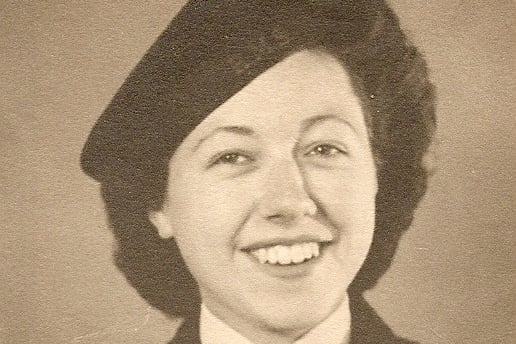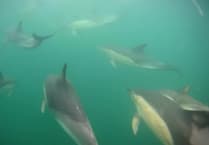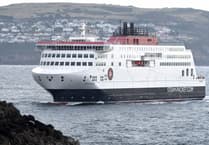Kathleen Oates - a Wren assigned to the Women's Royal Naval Service during the Second World War - was transferred to the Isle of Man in 1944, where she would stay for almost 18 months. During her time on the island, she wrote dozens of letters to home which provide a unique commentary on the operations at Ronaldsway and what life was like on the Isle of Man 80 years ago. Her daughter, CHRISTINE SMITH, pores through her mother’s letters as part of a series of columns based on Kathleen Oates’s writing...
Kathleen Oates would take a fortnight’s leave after her letters home at the start of September, written eighty years ago this week. As ever, she was fully immersed in the life of the Base, now that she was once more mobile.
Her letter of August 31 mentioned a visit which was not widely covered in the local press because of its relatively unofficial nature. ‘I saw the new Governor and his wife arrived today in a beautiful Dakota. The present Governor and the Captain met the plane on its arrival. The present Governor is going to Northern Ireland.’
The Manx press covered the new Governor’s official arrival in a twin-engine Lockheed on September 8. Luckily, a footnote in the Isle of Man Times of that day clarified the different accounts, reporting that ‘there has been a tradition that the retiring Governor and his successor must remain at arm's length; apparently it was thought that the hardened sinner would corrupt the novice. Well, the tradition has been broken. It received the death blow, indeed, on Friday of last week [i.e. August 31, witnessed by Kathleen], when Sir Geoffrey Bromet flew to the island and was entertained at Government House.’ Sir Geoffrey Bromet, who had been an Air Officer Commander in the War, would remain as Governor until 1952.
On the work front, things were temporarily on the slow side, and as ever, rumours were circulating about what might come next. ‘Our weather now is most odd: there is a clammy sort of mist over the island which the sun can’t penetrate - we’re hardly doing any work. They won’t fly in this weather because they don’t take any risks in the training now [i.e. now that the War was over], of course most of the men say that it’s a risk to even look at a Barracuda! We are still continuing with our flying programme. I believe the last course comes in October and the station is supposed to close for training on December 31. What will happen then, I don’t know!’
There was, unsurprisingly, confusion and discussion among Ronaldsway personnel over what to do next. ‘We’ve decided in the Cabin that we’d do better to stay in the Services than to return to Civvy Street, with all its restrictions and rations. One can volunteer now to serve until December 1946.’

Despite the uncertainty – or maybe because of it – the social life of the Base continued apace. She reported that on Wednesday August 29, ‘I went to the 21st birthday party of one of the air gunners, held at Derby Haven Hotel. I had two glasses of sherry – that’s all. The dance was excellent – there were limited numbers of people, so that dancing was enjoyable. We had lots of ice cream and very tempting refreshments including cider, specially brought by plane from Devon. - I expect someone had wanted a pleasure flip [Forces slang for flight].’
That same night, hot on the heels of the birthday party ‘was the Control Tower dance. I spent all afternoon helping to decorate the cinema with flowers – it looked really lovely when we’d finished.’
A few days later, Kathleen saw the film ‘Janie’ at the camp cinema. ‘It was very amusing but I laughed more at the reactions of the audience than at the film itself. There’s always an uproar when anything to do with the Navy comes into a film. For example, an American sailor who had been torpedoed and saved from a raft, was telling his girlfriend that in every wave that splashed against the raft, she was there in his mind etc. etc. – you can imagine the howls of derision and laughter from the men!’
On one of her afternoons off, ‘we were all having a cup of tea, when one of the sub lieutenants from the Control Tower asked us if we’d like to go crabbing in the evening from Langness Rocks. It sounded interesting, so we said we’d go. You have a long rod with a hook on one end. This, you poke down the crab holes in the rock crevices and you eventually find a crab – with luck! They got four altogether and gave them to the village people. They are quite expensive to buy here. Some of the villagers were trying to catch salmon: we saw them leaping in the sea, making a very loud splash.’
A later letter told of her activities on September 1-2. ‘I didn’t have a very exciting weekend. Saturday, I went to a camp dance with one of the air gunners. On Sunday, we had a great treat – the sun shone in the afternoon. We put on civvies and lay on the beach.’
Kathleen’s thoughts at the start of September were also with her upcoming leave. She was planning a visit to London with her sister Dorothy, writing that she wished that ‘you were in the Services – we’d be able to do it much cheaper. You’ll probably be able to go with me into canteens, however.’
Her letter of September 4 finished with ‘This will probably the last letter you receive before I’m home on leave – I should arrive Thursday [September 6] with luck, so unless you receive a telegram to the contrary, you can expect me. I’m afraid I’ll have to pay my own fare this time as I have no more warrants left.’
Kathleen’s next letters home from Ronaldsway would be written at the end of September.
.jpg?trim=0,0,0,75&width=752&height=501&crop=752:501)


.jpeg?width=209&height=140&crop=209:145,smart&quality=75)
